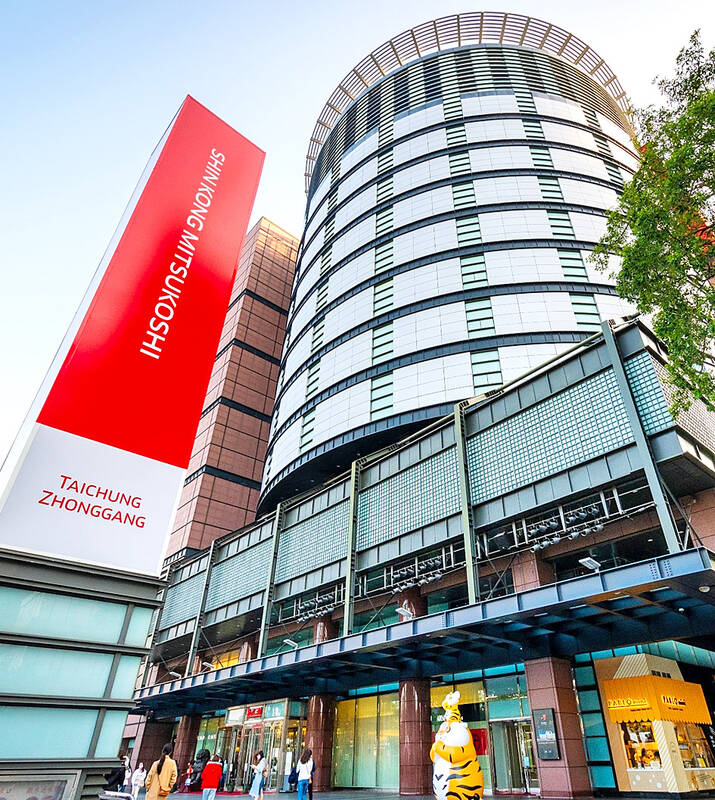Shin Kong Mitsukoshi Department Store (新光三越百貨) yesterday said it aims to grow its business 20 percent annually in the mid-year sales season, as people regain interest in in-person shopping activities.
The mid-year sales season begins on Thursday and runs through June 25 to keep buying interest alive after Mother’s Day promotion campaigns that enabled major department stores to increase their revenue by double-digit percentages year-on-year.
Shin Kong Mitsukoshi said its goal is achievable as its sales in the first five months of the year had already increased 15 percent year-on-year.

Photo: Tang Tsai-hsin, Taipei Times
A spike in COVID-19 infections forced the chain to halt traditional mid-year promotions last year, it added.
This year, the department store chain plans to offer costumers more bonus points that can be used for goods and services under more favorable terms, it said, adding that it expects customers to convert about 180,000 bonus points and enjoy discounts of up to 40 percent.
The bonus program is intended to attract return customers and boost member loyalty, it said.
Shin Kong Mitsukoshi has 3 million members and that figure might approach 4 million toward the end of the year, it said.
It said it has observed a boom in demand among Taiwanese shoppers for golfing, yoga and camping gear in the post-COVID-19 era, as people seem more focused on their health and well-being.
By contrast, foreign shoppers from Southeast Asia are displaying a keen interest in cosmetic products, it added.

Semiconductor shares in China surged yesterday after Reuters reported the US had ordered chipmaking giant Taiwan Semiconductor Manufacturing Co (TSMC, 台積電) to halt shipments of advanced chips to Chinese customers, which investors believe could accelerate Beijing’s self-reliance efforts. TSMC yesterday started to suspend shipments of certain sophisticated chips to some Chinese clients after receiving a letter from the US Department of Commerce imposing export restrictions on those products, Reuters reported on Sunday, citing an unnamed source. The US imposed export restrictions on TSMC’s 7-nanometer or more advanced designs, Reuters reported. Investors figured that would encourage authorities to support China’s industry and bought shares

FLEXIBLE: Taiwan can develop its own ground station equipment, and has highly competitive manufacturers and suppliers with diversified production, the MOEA said The Ministry of Economic Affairs (MOEA) yesterday disputed reports that suppliers to US-based Space Exploration Technologies Corp (SpaceX) had been asked to move production out of Taiwan. Reuters had reported on Tuesday last week that Elon Musk-owned SpaceX had asked their manufacturers to produce outside of Taiwan given geopolitical risks and that at least one Taiwanese supplier had been pushed to relocate production to Vietnam. SpaceX’s requests place a renewed focus on the contentious relationship Musk has had with Taiwan, especially after he said last year that Taiwan is an “integral part” of China, sparking sharp criticism from Taiwanese authorities. The ministry said

US President Joe Biden’s administration is racing to complete CHIPS and Science Act agreements with companies such as Intel Corp and Samsung Electronics Co, aiming to shore up one of its signature initiatives before US president-elect Donald Trump enters the White House. The US Department of Commerce has allocated more than 90 percent of the US$39 billion in grants under the act, a landmark law enacted in 2022 designed to rebuild the domestic chip industry. However, the agency has only announced one binding agreement so far. The next two months would prove critical for more than 20 companies still in the process

CHANGING JAPAN: Nvidia-powered AI services over cellular networks ‘will result in an artificial intelligence grid that runs across Japan,’ Nvidia’s Jensen Huang said Softbank Group Corp would be the first to build a supercomputer with chips using Nvidia Corp’s new Blackwell design, a demonstration of the Japanese company’s ambitions to catch up on artificial intelligence (AI). The group’s telecom unit, Softbank Corp, plans to build Japan’s most powerful AI supercomputer to support local services, it said. That computer would be based on Nvidia’s DGX B200 product, which combines computer processors with so-called AI accelerator chips. A follow-up effort will feature Grace Blackwell, a more advanced version, the company said. The announcement indicates that Softbank Group, which until early 2019 owned 4.9 percent of Nvidia, has secured a